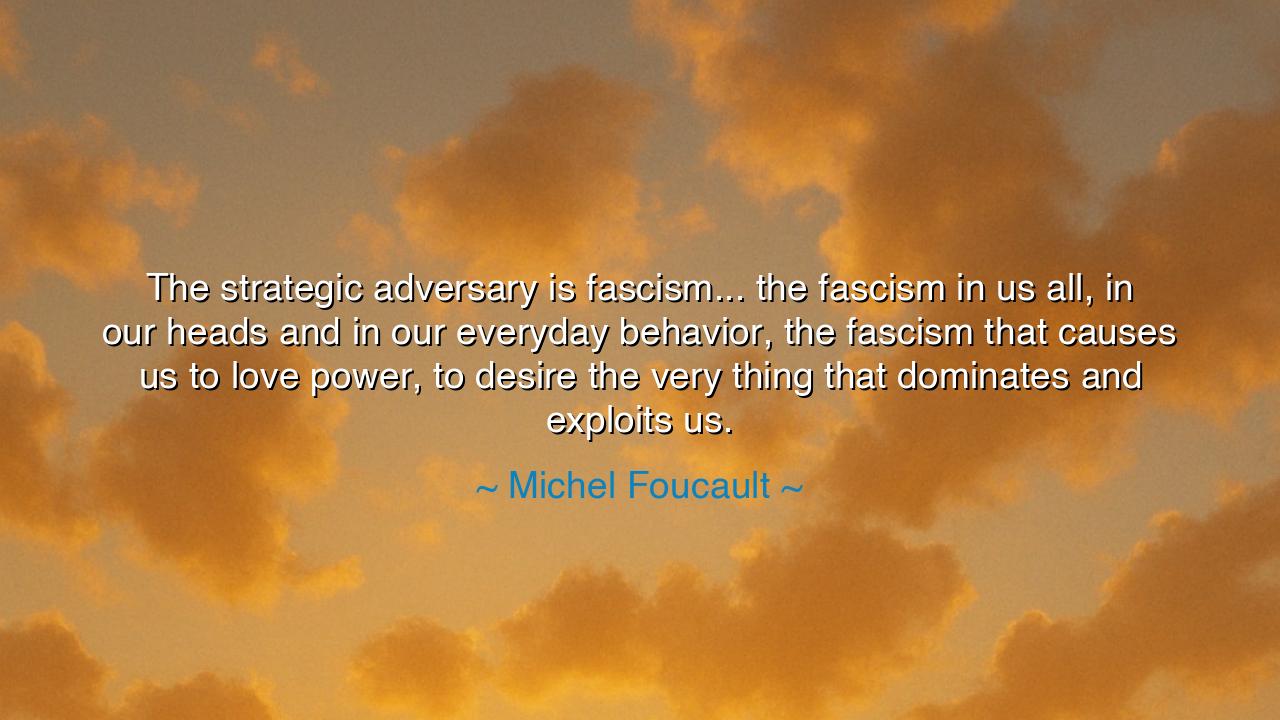
The strategic adversary is fascism... the fascism in us all, in
The strategic adversary is fascism... the fascism in us all, in our heads and in our everyday behavior, the fascism that causes us to love power, to desire the very thing that dominates and exploits us.






The words of Michel Foucault burn with unsettling clarity: “The strategic adversary is fascism… the fascism in us all, in our heads and in our everyday behavior, the fascism that causes us to love power, to desire the very thing that dominates and exploits us.” In this he reveals a truth darker than armies or dictators: that tyranny does not only rise from the outside, but grows like a seed within the hearts of men. The greatest enemy is not merely on the battlefield but in the secret chambers of desire, where we cling to the chains that bind us.
For fascism is not only a political order; it is a spirit, a sickness of the soul. It whispers that domination is natural, that obedience is easier, that to surrender one’s freedom for the comfort of order is good. It teaches us to admire power, to envy the strong hand that crushes, to find safety in the very structures that exploit us. This is why Foucault calls it the “strategic adversary”—because unless we defeat the fascism within, we will always be vulnerable to the fascism without.
History cries aloud with examples. In Nazi Germany, millions submitted not only from fear but from belief, celebrating the very order that enslaved them. The banners, the salutes, the marches—these were not imposed by force alone but embraced as ritual, as belonging, as the seduction of power itself. Ordinary men and women became participants in their own domination, proving Foucault’s warning that the enemy lives also in our everyday behavior.
Yet there is hope, for to see the adversary clearly is the first step toward freedom. By naming the fascism within—our desire to control, our longing to be controlled—we awaken to resist it. The struggle is not only in parliaments or streets, but in our thoughts, our families, our workplaces, where habits of domination can be unlearned and replaced with justice, humility, and courage. True liberation requires vigilance not only against tyrants but against the tyrant that whispers in every human soul.
Therefore, let this wisdom be preserved: beware not only the despot upon the throne but the despot within your breast. Do not mistake love of power for strength, nor desire for domination as safety. For as long as men worship the very forces that exploit them, fascism will rise again in new forms. Foucault’s words are both warning and summons: to fight not only external chains, but to cast down the idol of power in our own hearts, that we may stand free and keep the world free.






CHChieu Ha
This perspective challenges me to think about how easily we mistake dominance for stability. If fascism can exist in everyday behavior, then maybe it’s not just about politics—it’s about how we treat others, how we think, even how we desire. But that’s overwhelming. How can individuals resist something so pervasive without becoming paralyzed by guilt or self-doubt? Is awareness enough, or does it demand radical action?
TTVang Thi Trang
There’s a paradox here that I find fascinating: the same instincts that make us want freedom also make us crave order and control. Does that mean resistance will always be incomplete? I wonder how much of what we call ‘discipline’ or ‘ambition’ is just socially acceptable submission to power. Are we capable of building systems that don’t eventually recreate the hierarchies we oppose?
MP7/11 Nguyen Hoang Mai Phuong
What I find most striking is the idea that the real enemy isn’t just governments or institutions but the mindset that sustains them. How do we resist something that’s inside us? It seems like every time we rebel against one form of domination, another reappears in a different shape. Maybe the struggle Foucault describes isn’t meant to be won, but to be continually recognized and questioned.
ANAnh Nguyet
Foucault’s insight feels uncomfortably true in today’s world, especially with how social media fuels competition, conformity, and ego. Are we unknowingly nurturing the same power structures we claim to resist? I’m curious whether awareness alone can break that cycle. Can people truly free themselves from the fascination with authority and control, or is the love of power too deeply embedded in human nature?
YNLe Yen Nhi
This quote hits hard because it forces me to confront the idea that oppression isn’t just external—it’s internalized. It makes me wonder how much of my behavior unconsciously supports systems of control or hierarchy. Is it even possible to fully rid ourselves of that desire for power or approval? Maybe fighting fascism isn’t just political—it’s psychological, a constant process of unlearning what we’ve been taught to value.